Entries tagged as trip2011
Related tags
amusementpark asia beijing china cinderella copyright disney disneyland fake freesoftware shijingshan stepmania travel almaty asia2013 aviation azerbaijan baikal belarus berlin border bus capsulehotel caspian ccp censorship childrensday chinghai climatechange coach dam dunhuang ecology erenhot erlian ferry flying greatfirewall guangzhou haikou hainan hohhot hongkong hostel hotel irkutsk journey kazakhstan khorgas kualalumpur language laos lenin listwjanka malaysia metro miradormansion mongolia moscow petropavl poland portbaikal publictransport pyramid qwerty rain rainforest russia sanya seat61 suprememaster terracottawarriors thailand tiananmen ticket train tram transport transsib transsiberian travelling typhoon ulaanbaatar ulan-ude ulanude urumqi vegan vegetarian visa warsaw waterpower weather windenergy xian xinjiang yanoda yekaterinburg yining zamyn-uud zensur migrationcard boten casino ghosttown atomkraft epr freedomofspeech gentoo nuclear politics sortirdunucleaire babelfish boluo chinese coffee copycat english freizeitpark googletranslate hallstatt huizhou journalismus luoyang mandarin northwestchina presse pressefreiheit russian tagesschau translation universaltranslator cement climate decarbonization industry steel 68 aacs abmahnung alecempire aliens art banksy barrierefrei berneconvention bittorrent bitv blueray brigittezypries buch bücher bundestag ccc cedric chaosradio corruptibles cpdl creativecommons culturalflatrate culture datenschutz demonstration di drm easterhegg ebook epetition eu eucopyrightdirective evrimsen fanart fanfiction filesharing film freeculture freifunk frequencies funkerspuk gema gemavermutung geodaten graffiti gutenberg gvl hacker hddvd hiddenfrontier html ifpi illegalart iromance itu jankroemer justizministerium kinderlieder kopierschutz kriegderwelten kts kultur laterne laternenumzug lessig licenses linux lug markenrecht metis movies mpaa musik musikindustrie musikpiraten mysmartgrid negativland netradio nocopy patent patente penguinbooks petition piratbyrån piratebay politik publicdomain radio radiopolitik raubdruck raubkopie remix rsa rsaoaep rsapss sanktmartin savenetradio sciencefiction spiritlevel startrek thepiratebay tomcruise trips tuxmas tuxmas07 usa usbstick verwertungsgesellschaft vgmusikeditionen vgwort vlc w3c warez webradio wipo wizo wos wos4 altparty antinuclear cablemodem d-link demoscene efficiency eletricity environment finland helsinki kabeldeutschland loviisa o2 router strom stromverbrauch umwelt 23c3 27c3 3d 3ddrucker adobe ati backnang base64 bash beryl bios blob bonn bufferoverflow camera canon cellular chdk chemnitz chromium cinelerra clt code codecs compiz compizfusion composite compression console csrf css cve ddwrt debian desktop developingworld digitalcamera driver dvd eltorito evince exe ffmpeg firefox firmware france freewvs freiegesellschaft frequency froscon froscon2007 fsf fsfe gaia games gargoyle ghost gimp glibc gnome google googleearth graphics grub gsm hardware heartbleed homebrew ibm ico icons icoutils iso ixus jugendumweltbewegung jukss karlsruhe kde königswusterhausen kpdf laptop lenovo license lpi lpic lspci lsusb memdisk messe microsoft mobilephones movie nancy nessus nouveau nvidia ökologie okular olpc openbsc openbts openexpo opengl opensourceexpo openssl openstreetmap openvas osmocombb pciids pdf phoronix php poppler privacy rapidprototyping rar realmedia realvideo redhat reprap retrogames reverseengineering rmll rv30 rv40 s9y science script security serendipity sfd shellshock siegburg simcity society softwarefreedomday sqlinjection sumatrapdf sunras syslinux talk theory thesource theunarchiver thinkpad unar usbids video videoediting vulnerability web wii wiibrew wiki windows windowsrefund wiretapping wrestool xorg xss alps architecture astana baiterek khanshatyry koktobe migrationpolice mountains shymbulak snow diplomathesis simple thesis upgoerfive words arcade computerhistory magistral museum retro tankodrom mappus police policeviolence protest rech s21 schuster stuttgart stuttgart21 traffic crookedforest forest gryfino nature places 1mai akongress anarchiekongress bild bz internetzensur netzneutralität polizeigewalt springer tuberlin youtube zensursulaFriday, July 29. 2011
Behind the great firewall
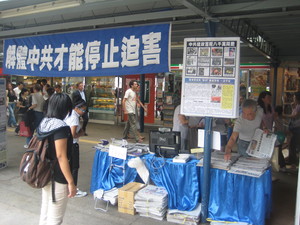 When thinking about China, probably many people associate this with censorship.
When thinking about China, probably many people associate this with censorship.On my trip, I had the chance to see the infamous great firewall from the inside. I haven't done any deeper analysis, but I'll share some thinkgs I've observed. A couple of famous sites (for example Twitter, Flickr) are blocked. Contrary to what many people may believe, webpages that are often associated with Warez (Rapidshare, Pirate Bay) were also blocked. The situation with Wikipedia was mixed. Most of the time, I could read the texts on Wikipedia, but access to the image servers was blocked. At the end of our trip, I couldn't access Wikipedia any more.
I encountered no blocks on less famous sites, although I regularly surf sites that could be labelled politically controversial. Though this probably doesn't tell much, except that the chinese authorities are not very interested in blocking european websites.
Interesting may be that the blocking works on an IP level. DNS resolution of blocked sites still works, but you cannot ping the IPs. I haven't extensively tried to circumvent the censorship, as I had no pressing need for it. The only thing I tried was an SSH tunnel, but that usually wasn't possible as the connection never was fast and reliable enough for a stable SSH session.
Most Hotels and Hostels provide Internet access - but most of them by cable. Usually, in other countries today this is done via wireless lan. My theory on that is that a cable-based Internet access makes it easier to log activity associated to a specific person (you always have to show your passport when you check into a Hotel). But still, we had anonymous Internet access (both wireless and cable) at a few places.
Another thing I'd like to mention is what the (non-technical) censorship did with me. I knew that in China people cannot just write a blog, they need some kind of license for it. I was very unsure what this means for me as a forein traveller. I came to the conclusion that I likely won't get any trouble if I just write about my trip without touching any controversial topics. Although I hadn't planned to write anything, this was always in my mind and probably influenced my writings. There was one time where I self-censored myself. In the entry about Hong Kong, I originally had this part, which I removed before publishing:
Most notably it is a place where free speech is possible to a much higher degree than in mainland China. This makes it a very important place for political discussion about China in general. We saw chinese dissident groups that had their information tables and spread leaflets around the Kowloon harbour.
Not much and I luckily have the opportunity to publish it now.
Posted by Hanno Böck
in English, Life, Politics
at
11:46
| Comment (1)
| Trackbacks (0)
Defined tags for this entry: asia, censorship, china, greatfirewall, hongkong, travel, trip2011, zensur
Sunday, July 17. 2011
Alternative routes through Kazakhstan
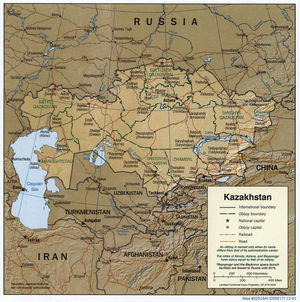 I have promised to write something about the route we had planned to take for the way back from China to Europe. We had several variants in mind, I'll list them all. All of them, however, have in common that they start in Ürümqi (乌鲁木齐, ئۈرۈمچی) - and as I already wrote, the train line to Ürümqi seems to be a bottleneck - it was booked out for an unknown amount of time.
I have promised to write something about the route we had planned to take for the way back from China to Europe. We had several variants in mind, I'll list them all. All of them, however, have in common that they start in Ürümqi (乌鲁木齐, ئۈرۈمچی) - and as I already wrote, the train line to Ürümqi seems to be a bottleneck - it was booked out for an unknown amount of time.Ürümqi is a town in the Uyghur province of China in the north-west. It is north of the Taklamakan desert. China's population is not evenly spread through the country. Most of the population lives in the eastern part. The west is sparsely populated and Ürümqi is one of the very few big cities in the west.
From Ürümqi, there are several options to go to Kazakhstan - there exist trains and busses both to Astana (Астана, أستانا), the current capital of Kazakhstan, and Almaty (Алматы, الماتى), the former capital.
Variant a: Twice through russia (our preferred option).
From Astana, there is a train directly to Kiev (Київ) in Ukraine. The train goes twice through russia. Once it scratches it before Oral / Uralsk (Орал). I think it doesn't even stop there. The other time it goes through the Caucasus region.
It should've been possible to buy the train ticket in Astana and then get a transit express visa in the russian consulate. I read some reports suggesting that EU people were able to do this. However, I was not entirely sure about that: Usually, a russian transit visa only allows to pass the country a single time. I don't know if crossing the country twice would've posed any problems.
Astana to Kiev is quite long - stopping was a problem, because you can only get the transit visa once you have the ticket for the whole journey. So our plan was to take the train just to Kharkiv (Харків) in the east of Ukraine. This would've limited the train trip to a bit more than two days. Still a lot, but acceptable for me.
Variant b: Once through russia.
Oral/Uralsk (Орал) in western Kazakhstan has its own russian embassy. As stated above, the train from Astana to Oral already crosses russia, but there's a way round: One can first take the train to Atyrau (Атырау) and then to Oral. This way, you don't leave Kazakhstan. The advantage: Lots of options to make stops, no overly long train trips.
The problem with this variant was that I had almost no information about the consulate in Oral: I haven't read a single report online that any EU citizen tried or successfully applied for a transit visa there. I only found some people asking that question, but without answers. So it was quite unsure if this would work.
Variant c: Avoiding russia altogether (option we originally intended to take).
It is also possible to avoid passing russia altogether. One can go by train to Atyrau (like in variant b), but then take a train on to Aktau (Ақтау) at the caspian see. From Aktau, there is a ferry service to Baku in Azerbaijan.
Now, this "ferry" has its own problems: It has no regular schedule. In fact, from what I read its no real ferry at all, but a cargo ship. It starts when there's enough cargo. So you have to get there and ask every day if there will be a ship today. Waiting times rank between some days and two weeks. I had liked to take that option, because I like travelling by ship and I thought that sounded like an interesting experience.
From Azerbaijan, one could take a train to Tbilis in Georgia and continue by bus to Istanbul in Turkey. From there, there is a train to Austria (the orient express sadly doesn't exist any more).
We had our visas ready for Kazakhstan and Azerbaijan. Georgia and Turkey are visa free for EU citizens.
If you look at a map, you may notice that there's another option: Going from Kazakhstan to Turkmenistan and Iran. However, that would've imposed getting two more visa plus the feeling that travelling through Iran might be a risk. So I haven't really investigated that option very much.
Posted by Hanno Böck
in English, Life
at
22:30
| Comments (0)
| Trackbacks (0)
Defined tags for this entry: asia, azerbaijan, caspian, china, ferry, kazakhstan, russia, travel, trip2011, visa
Friday, July 15. 2011
Visa
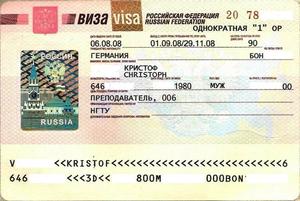 For our trip, we needed a couple of visa. I haven't applied myself for a visa any time before, so this was quite new to me. This was the most troublesome part of our travel preparations.
For our trip, we needed a couple of visa. I haven't applied myself for a visa any time before, so this was quite new to me. This was the most troublesome part of our travel preparations.What I learned about getting visa:
- Every country has different rules for visa.
- You cannot apply for several visa at once - they take your passport. That means you have to add all the waiting times and cannot apply for more than one at once (this may seem trivial if you know the procedure, but I didn't).
- The information on the consulates webpages is often incomplete or inaccurate. (For example, if you have a 30 day visa: Does that mean 30 days starting from your entry to the country? Or 30 days starting from a fixed date you have to know in advance? Pretty relevant if you plan your trip.)
- If you phone a consulate, they won't answer. If you email a consulate, they won't answer.
- You cannot expect that anyone in the consulate is able to speak to you in a language you understand.
- You cannot expect that information you got from people in the consulate is correct.
- Usually, the best way to get information is searching the internet for people who have done the same thing before. There are specialized companies that arrange your visa, but the information you get from them is also often inaccurate.
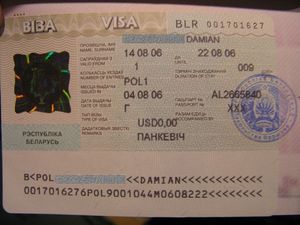 In the end, we applied for 6 different visa (Russia, Mongolia, Belarus, China, Kazakhstan, Azerbaijan), although we didn't use them all in the end (see previous blog entry).
In the end, we applied for 6 different visa (Russia, Mongolia, Belarus, China, Kazakhstan, Azerbaijan), although we didn't use them all in the end (see previous blog entry).The most difficult part was the russian one. That was, in the end, the reason we couldn't make the trip the way we wanted to (taking the transsiberian train for both directions with stops). They have a kind of bizzare regulation regarding invitations: You need an invitation to apply for a russian tourist visa. This has evolved a market for agencies that arrange invitations. That means you pay them that they do a fake booking in a hotel you will never see in reality and get an invitation from them.
Another anecdote: When asking for the "two-way"-problem in the embassy, they gave us a contact to a travel agency that will help us. This travel agency suggested we could get two passports and thus apply for two visa - that would've been illegal according to russian law. I had no intention in seeing a russian jail from inside, so I refused to choose that option.
You see, it's a pretty complex issue. But there's one thing one should mention, too: It's not the russian (or other countries) authorities that are to blame here. Russia is very willing to relax its visa rules. They even suggested several times to abbadon the visa requirement for EU citizens at all. They just have one requirement: The regulation should be relaxed for their citizens, too. Everything I've heared suggests that russians trying to get a visa for Germany and other EU countries face more difficulties than the other way round. It's the EU that is blocking here.
If you want visa regulations to be relaxed, you'd better not only blame other countries regulations. You should also ask how regulation is the other way round. Looking at the current political debate in the EU, I don't have much hope that the situation will improve soon.
(the pictures are from Wikimedia Commons here (Russia) and here (Belarus) and are public domain)
Posted by Hanno Böck
in English, Gentoo, Politics
at
22:56
| Comments (5)
| Trackbacks (0)
Defined tags for this entry: asia, azerbaijan, belarus, china, kazakhstan, mongolia, russia, travel, trip2011, visa
Wednesday, July 13. 2011
Unexpected difficulties on our trip
My Asia trip is over. I'll try to sum up some experiences I made.
In the end, we couldn't do a lot of things we had planned to do, especially for the China part of our trip. Due to a number of reasons, our approximate time plan completely didn't work. Sometimes this was due to a lack of information (e. g. not finding a ferry / a bus we've read about) and communication possibilities. A surprising problem was also the lack of internet information: It seems having a webpage is far less common in China, many transport operators, hotels or other venues had no internet presence at all, not even a chinese one.
Very time consuming were unplanned stops due to simple health problems like a cold.
I think I wrote that some times before, but I had never expected the difficulties with the language. The idea that English is some kind of "international communication language" is not very common in Russia and China - I think we stayed in a couple of cities where we didn't meet a single person we could talk to. I felt this was a great limitation for my possibilities to get to know those countries better.
Another unexpected difficulty was getting any medicine. I had thought that in any country in the world you should be able to get some equivalent medicine if you show the pharmacy personal the scientific name of the ingredient. This worked in Russia, but it didn't work in China - and I tried a lot of pharmacies. I suggest if you ever go to China, take everything you usually use to handle small issues like a cold or a headacke in large enough quantities.
In the preparation phase of the trip, I was often warned of safety issues like pickpocketing. This was almost a non-issue. Nothing was stolen from me and I don't remember even an attempt to do so, although we visited places like the Naran Tuul market in Ulaanbaatar, where everyone will tell you that pickpocketing is a big issue. I don't know if I was just lucky, but I had the feeling that using common sense and always looking after your belongings is enough to handle this.
In the end, we couldn't do a lot of things we had planned to do, especially for the China part of our trip. Due to a number of reasons, our approximate time plan completely didn't work. Sometimes this was due to a lack of information (e. g. not finding a ferry / a bus we've read about) and communication possibilities. A surprising problem was also the lack of internet information: It seems having a webpage is far less common in China, many transport operators, hotels or other venues had no internet presence at all, not even a chinese one.
Very time consuming were unplanned stops due to simple health problems like a cold.
I think I wrote that some times before, but I had never expected the difficulties with the language. The idea that English is some kind of "international communication language" is not very common in Russia and China - I think we stayed in a couple of cities where we didn't meet a single person we could talk to. I felt this was a great limitation for my possibilities to get to know those countries better.
Another unexpected difficulty was getting any medicine. I had thought that in any country in the world you should be able to get some equivalent medicine if you show the pharmacy personal the scientific name of the ingredient. This worked in Russia, but it didn't work in China - and I tried a lot of pharmacies. I suggest if you ever go to China, take everything you usually use to handle small issues like a cold or a headacke in large enough quantities.
In the preparation phase of the trip, I was often warned of safety issues like pickpocketing. This was almost a non-issue. Nothing was stolen from me and I don't remember even an attempt to do so, although we visited places like the Naran Tuul market in Ulaanbaatar, where everyone will tell you that pickpocketing is a big issue. I don't know if I was just lucky, but I had the feeling that using common sense and always looking after your belongings is enough to handle this.
Tuesday, July 12. 2011
Travelling without flying - how I failed
I haven't stepped into an airplane for about 12 years. I travelled a lot through Europe with ferries, trains, busses and hitchhiking. It was my plan to stick to that on this big trip.
It's a simple fact that there is no viable option to use airplanes on a regular basis in a responsible way. There is no thinkable way that all humans on this planet can have access to planes. It only works because it's a privilege of a rich minority. And there's no thinkable way of combating climate change with the current growth rate of the aviation industry - not to mention the dangers of Peak Oil and unconventional oil extraction.
Some environmentalists who like flying found a very creative way to circumwent this: Compensating emissions. You pay an amount of money that's invested in some climate project for every flight you do. If I had to name the three most ridiculous actions people invented in combating climate change, compensating flight emissions would certainly rank amongst them (for the other two I'd vote carrot mobs and lights off actions). As above, this only works for a very small minority of rich people.
Ok, so back to our trip. It was my plan to avoid flying. I wanted to proove myself and others that it's possible. I failed. I took a plane from Beijing back to Germany. For a relatively trivial reason: Our plan was to take a train to Urumqi, then go to Kazakhstan and then we had two options, one with a train through russia to Ukraine and one through the caspian see to Azerbaijan (I will describe those in detail in a later blog entry). All of them requried getting to Urumqi first. There's no alternative route with public transport. And here's the problem: All tickets to Urumqi were sold out - for the whole time they can be booked in advance. So we wouldn't get tickets for an unknown amount of time.
I the end, after checking all alternative options I could think of, I decided to take a plane back to Germany and shorten my trip. I wasn't that unhappy about it after all, because I experienced our trip much more exhausting than imagined.
There would've been one other option: Taking the transsiberian train back. But that imposes another difficulty that has to do with russias visa regulation. A russian tourist visa is valid for 30 days. So ours is expired. It is not possible to get two visa at the same time, so it was not possible to arrange this in advance (it was our original plan to go back through Russia). And it is not possible to get a russian tourist visa anywhere else than in your home country. It used to be possible in Hong Kong in the past, but recently russia has tightened its visa regulations and according to several online sources this is no longer the case. The only option is getting a Russian transit visa. But that means you have to do the whole trip in a row and have all the tickets to Moscow and further to another country ready beforehand. This means several days in a train without much possibility to pause. I decided that I'm not up for that. I already found the many long train trips we did very difficult, partly because I'm slightly claustrophobic. My girlfriend will do the train trip - I won't. If you are ever in the same situation and need a travel agency, I can suggest Monkey Shrine - they are quite expensive, but their service was excellent. They were able to arrange all tickets including ones from Moscow to Kiev or Tallin and offered a lot of different options for all parts of the trip.
Now I don't think that my single flight will change much. It was a symbolic thing. But I think that opening options for flightless travelling is essential and gets far too less attention. If people talk about environmental or sustainable tourism, the issue of aviation is rarely spoken about. Often enough the problem is just that it is never considered. Take the visa regulation: If you enter and leave a country with an airplane, you usually don't need any visa - even if you change the plane within the country. There's no comparable rule for trains. You even need a visa if you enter and leave a country in a train without a stop. If you're looking for organized transsiberian railway trips, almost all the time it's taking the train for one direction and the plane for the other. Different public transport options often don't fit very well together. I always illustrate this with an experience I had last year when I switched from the train in Zeebrugge in Belgium to the ferry to Edinburgh - there was not any proper footpath from the train to the ferry, although they were only some dozent meters apart. You had to either illegally cross the railway lines or walk on a big street without a footway. I think many missing links for travel options could be closed if there would be more people doing it (e. g. there is no ferry from Singapoure or other Asian countries to Australia and none between Russia and Alaska, although the way isn't that far).
These are just some unfinished thoughts, but I could imagine there is a need for a lobby for flightless travelling. There's much more one could write about it. Flightless travelling means slower travelling - which brings up a discussion about our relation to working time.
If you're interested in flightless travelling, the best online ressource I found is the great webpage seat61.
My trip ends here, but some more blog entries will follow with stuff I didn't find the time yet to write down.
It's a simple fact that there is no viable option to use airplanes on a regular basis in a responsible way. There is no thinkable way that all humans on this planet can have access to planes. It only works because it's a privilege of a rich minority. And there's no thinkable way of combating climate change with the current growth rate of the aviation industry - not to mention the dangers of Peak Oil and unconventional oil extraction.
Some environmentalists who like flying found a very creative way to circumwent this: Compensating emissions. You pay an amount of money that's invested in some climate project for every flight you do. If I had to name the three most ridiculous actions people invented in combating climate change, compensating flight emissions would certainly rank amongst them (for the other two I'd vote carrot mobs and lights off actions). As above, this only works for a very small minority of rich people.
Ok, so back to our trip. It was my plan to avoid flying. I wanted to proove myself and others that it's possible. I failed. I took a plane from Beijing back to Germany. For a relatively trivial reason: Our plan was to take a train to Urumqi, then go to Kazakhstan and then we had two options, one with a train through russia to Ukraine and one through the caspian see to Azerbaijan (I will describe those in detail in a later blog entry). All of them requried getting to Urumqi first. There's no alternative route with public transport. And here's the problem: All tickets to Urumqi were sold out - for the whole time they can be booked in advance. So we wouldn't get tickets for an unknown amount of time.
I the end, after checking all alternative options I could think of, I decided to take a plane back to Germany and shorten my trip. I wasn't that unhappy about it after all, because I experienced our trip much more exhausting than imagined.
There would've been one other option: Taking the transsiberian train back. But that imposes another difficulty that has to do with russias visa regulation. A russian tourist visa is valid for 30 days. So ours is expired. It is not possible to get two visa at the same time, so it was not possible to arrange this in advance (it was our original plan to go back through Russia). And it is not possible to get a russian tourist visa anywhere else than in your home country. It used to be possible in Hong Kong in the past, but recently russia has tightened its visa regulations and according to several online sources this is no longer the case. The only option is getting a Russian transit visa. But that means you have to do the whole trip in a row and have all the tickets to Moscow and further to another country ready beforehand. This means several days in a train without much possibility to pause. I decided that I'm not up for that. I already found the many long train trips we did very difficult, partly because I'm slightly claustrophobic. My girlfriend will do the train trip - I won't. If you are ever in the same situation and need a travel agency, I can suggest Monkey Shrine - they are quite expensive, but their service was excellent. They were able to arrange all tickets including ones from Moscow to Kiev or Tallin and offered a lot of different options for all parts of the trip.
Now I don't think that my single flight will change much. It was a symbolic thing. But I think that opening options for flightless travelling is essential and gets far too less attention. If people talk about environmental or sustainable tourism, the issue of aviation is rarely spoken about. Often enough the problem is just that it is never considered. Take the visa regulation: If you enter and leave a country with an airplane, you usually don't need any visa - even if you change the plane within the country. There's no comparable rule for trains. You even need a visa if you enter and leave a country in a train without a stop. If you're looking for organized transsiberian railway trips, almost all the time it's taking the train for one direction and the plane for the other. Different public transport options often don't fit very well together. I always illustrate this with an experience I had last year when I switched from the train in Zeebrugge in Belgium to the ferry to Edinburgh - there was not any proper footpath from the train to the ferry, although they were only some dozent meters apart. You had to either illegally cross the railway lines or walk on a big street without a footway. I think many missing links for travel options could be closed if there would be more people doing it (e. g. there is no ferry from Singapoure or other Asian countries to Australia and none between Russia and Alaska, although the way isn't that far).
These are just some unfinished thoughts, but I could imagine there is a need for a lobby for flightless travelling. There's much more one could write about it. Flightless travelling means slower travelling - which brings up a discussion about our relation to working time.
If you're interested in flightless travelling, the best online ressource I found is the great webpage seat61.
My trip ends here, but some more blog entries will follow with stuff I didn't find the time yet to write down.
Sunday, July 10. 2011
Welcome to Fake Disneyland
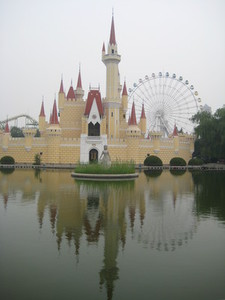 Maybe you've heared that some years ago, a story about a fake Disneyland amusement park in China made some rumors in the media. As I love good fakes, I obviously had to take a look. The amusement park in question is Shijingshan Amusement Park ( 北京石景山游乐园) and is located in Beijing. It can easily be reached, as it has its own metro station.
Maybe you've heared that some years ago, a story about a fake Disneyland amusement park in China made some rumors in the media. As I love good fakes, I obviously had to take a look. The amusement park in question is Shijingshan Amusement Park ( 北京石景山游乐园) and is located in Beijing. It can easily be reached, as it has its own metro station.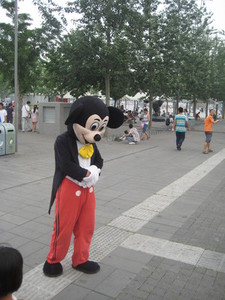 The park had the advertisement slogan "Disneyland is too far to go" some years ago and some images of Mickey Mouse and other Disney figures in the park boosted the story (see Wikipedia for details). Also, like all Disneylands, the Park has a Cinderella castle. It seems in the meantime things have changed - we didn't see any Disney charakters there. The only thing that still reminds of the story is the Cinderella castle - but as much as Disneys lawyers might want this, Cinderella is not a Disney invention after all.
The park had the advertisement slogan "Disneyland is too far to go" some years ago and some images of Mickey Mouse and other Disney figures in the park boosted the story (see Wikipedia for details). Also, like all Disneylands, the Park has a Cinderella castle. It seems in the meantime things have changed - we didn't see any Disney charakters there. The only thing that still reminds of the story is the Cinderella castle - but as much as Disneys lawyers might want this, Cinderella is not a Disney invention after all.I even found a fake Mickey Mouse (at least I think it was fake, it looked somehow wrong) in Beijing, but it was not in the amusement park, it was in the olympic village.
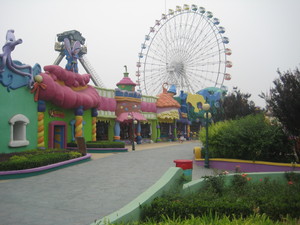 The story of a fake Disneyland seems highly exaggerated. The Cinderella is probably no issue at all, as I doubt there's anything that makes it a special "Disney-Cinderella". I'm not sure if there was a copyright violation at all: The fake Mickey Mouse and other figures in combination with the solgan could probably be considered parody - which is legally allowed in most of the world's copyright laws.
The story of a fake Disneyland seems highly exaggerated. The Cinderella is probably no issue at all, as I doubt there's anything that makes it a special "Disney-Cinderella". I'm not sure if there was a copyright violation at all: The fake Mickey Mouse and other figures in combination with the solgan could probably be considered parody - which is legally allowed in most of the world's copyright laws.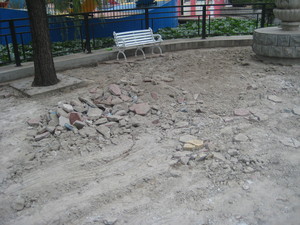 The park itself was kind of weird. Large parts of it were in really bad shape. Some looked like a construction site, many parts were not operational. On the other hand, other parts of it were really well-designed. One could hardly imagine that this was the same park.
The park itself was kind of weird. Large parts of it were in really bad shape. Some looked like a construction site, many parts were not operational. On the other hand, other parts of it were really well-designed. One could hardly imagine that this was the same park. A nice thing to mention: They had a dance dance revolution like arcade machine - but the game on it was StepMania - a free software game. I think this is the first time I saw a free software game in an arcade machine.
A nice thing to mention: They had a dance dance revolution like arcade machine - but the game on it was StepMania - a free software game. I think this is the first time I saw a free software game in an arcade machine.Unlike most european amusement parks, the pricing concept here is different - the entrance fee costs almost nothing (10 Yuan, approximately 1 €), but you pay for every ride.
Pictures from the park
Posted by Hanno Böck
in Copyright, English, Life
at
21:52
| Comments (0)
| Trackbacks (0)
Defined tags for this entry: amusementpark, asia, beijing, china, cinderella, copyright, disney, disneyland, fake, freesoftware, shijingshan, stepmania, travel, trip2011
Saturday, July 9. 2011
Beijing
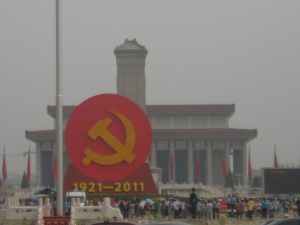 After Hong Kong, we left the south of China and went on to the capital Beijing (北京). The first days we stayed at a very helpful couchsurfer, later we switched to a Hostel again. That was kind of difficult. In China, not all Hotels are allowed to take foreigners - they need a special license for that. We knew that before, but we never found it to be a problem - at all other places we never went into a Hotel that rejected us. My impression is this rule is only enforced in the capital. Many Hotels are booked out at the moment and we had an unplesant experience with the Drum Tower Hostel: We got a confirmation per email the day before that they have a free room for us. When we got there, there was no free room. When we showed them the email, one of the Hostel's staff laughed at us. We didn't find this very funny.
After Hong Kong, we left the south of China and went on to the capital Beijing (北京). The first days we stayed at a very helpful couchsurfer, later we switched to a Hostel again. That was kind of difficult. In China, not all Hotels are allowed to take foreigners - they need a special license for that. We knew that before, but we never found it to be a problem - at all other places we never went into a Hotel that rejected us. My impression is this rule is only enforced in the capital. Many Hotels are booked out at the moment and we had an unplesant experience with the Drum Tower Hostel: We got a confirmation per email the day before that they have a free room for us. When we got there, there was no free room. When we showed them the email, one of the Hostel's staff laughed at us. We didn't find this very funny.We were in Beijing during the birthday of the chinese communist party (CCP). We didn't notice that much of it, except a big monument on Tian'anmen square (天安门广场).
We had some trouble with our next travelling steps, which I'll write up in detail in one of the next blog entries.
Pictures from Beijing
Friday, July 8. 2011
Hong Kong
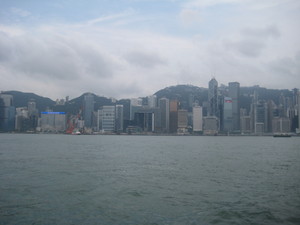 After staying on Hainan island, we went on to Hong Kong (香港). The main reason for that was a visa issue. A chinese tourist visa usually allows a stay for 30 days and we were nearing that 30 day periode. However, we had a double-entry visa which is valid for two entries with 30 days each. It would have been possible to request an extension of the stay for more than 30 days, but that would've taken several days we had to stay at the same place. So it was easier to just leave the country and come back at some point.
After staying on Hainan island, we went on to Hong Kong (香港). The main reason for that was a visa issue. A chinese tourist visa usually allows a stay for 30 days and we were nearing that 30 day periode. However, we had a double-entry visa which is valid for two entries with 30 days each. It would have been possible to request an extension of the stay for more than 30 days, but that would've taken several days we had to stay at the same place. So it was easier to just leave the country and come back at some point.Although Hong Kong is officially part of China, it has its own migration and border system, its own currency (the Hong Kong Dollar) and going to Hong Kong from China is like going to another country. Hong Kong itself requires no visa for EU citizens for up to 90 days.
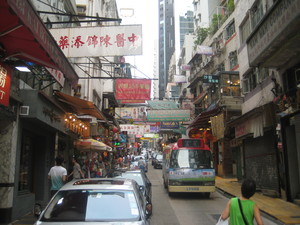 It was terribly difficult to get any accomodation. All Hotels we found were far beyond what we were willing to pay. In the end, for the first night we payed 350 HK$ (around 30 €) for a room without a window in a small hostel. The hostel was located in a big building called Mirador Mansion near Tsim Sha Tsui (尖沙咀) station which was full of mini-hostels, most of them only with a couple of rooms. However, most of them were booked out. Luckily, for the next day we found a room in the same building for 300 HK$ which was much better and had a window (where we could see the swimming pool on top of the next building, part of the Holiday Inn hotel, which was one of those we found far too expensive).
It was terribly difficult to get any accomodation. All Hotels we found were far beyond what we were willing to pay. In the end, for the first night we payed 350 HK$ (around 30 €) for a room without a window in a small hostel. The hostel was located in a big building called Mirador Mansion near Tsim Sha Tsui (尖沙咀) station which was full of mini-hostels, most of them only with a couple of rooms. However, most of them were booked out. Luckily, for the next day we found a room in the same building for 300 HK$ which was much better and had a window (where we could see the swimming pool on top of the next building, part of the Holiday Inn hotel, which was one of those we found far too expensive).In general I can say that although Hong Kong is somehow part of China, many things there are completely different. It feels much more like a western city. It has a lot of foreigners, many of them from India - which was good for us, because we could easily get vegetarian food in Indian restaurants. Also noteworthy is that English is the official second language in Hong Kong, so communication was much easier.
Hong Kong pictures (as always, not uploaded yet)
Tuesday, July 5. 2011
Vegetarian food in asia
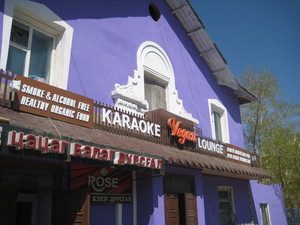 Being a vegetarian was a special challenge on our trip. It was difficult in Russia, where the food plan often enough was reduced to pizza margherita and pancakes. It was even more difficult in China, where the idea of having any food without meat seems to be widely unknown and the choice was often enough reduced to french fries from american fast food companies.
Being a vegetarian was a special challenge on our trip. It was difficult in Russia, where the food plan often enough was reduced to pizza margherita and pancakes. It was even more difficult in China, where the idea of having any food without meat seems to be widely unknown and the choice was often enough reduced to french fries from american fast food companies.But there was also a surprise: It was absolutely no problem in Mongolia - in sharp contrast to everything I've read before. Traditional mongolian food is very meat-oriented. But Ulaanbaatar has a density of vegetarian and vegan restaurants definitely higher than in Berlin. And even the little border town Zaamin-Üüd has a vegetarian café. Unlike one may expect, I never had the impression that they were primarily focussed to tourists. We even once were in a vegetarian restaurant in Ulaanbaatar that had only a mongolian menu without any english translation.
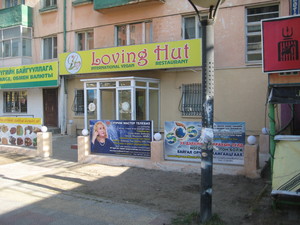 Most of those restaurants seem to be somewhat related to the "spiritual leader" Supreme Master Ching Hai. I don't know that much about her and her group, so I can't judge how problematic I find that (though I'm always sceptical both about leaders and about esoteric groups). Their arguments for veganism are mainly about the greenhouse gas emissions and climate change effects from meat productions, which is absolutely correct, but sadly their stated numbers are just wrong.
Most of those restaurants seem to be somewhat related to the "spiritual leader" Supreme Master Ching Hai. I don't know that much about her and her group, so I can't judge how problematic I find that (though I'm always sceptical both about leaders and about esoteric groups). Their arguments for veganism are mainly about the greenhouse gas emissions and climate change effects from meat productions, which is absolutely correct, but sadly their stated numbers are just wrong.
Posted by Hanno Böck
in Ecology, English, Life
at
10:27
| Comments (0)
| Trackbacks (0)
Defined tags for this entry: asia, china, chinghai, mongolia, russia, suprememaster, travel, trip2011, ulaanbaatar, vegan, vegetarian
Monday, July 4. 2011
Hainan Island
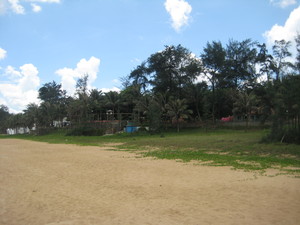 Hainan (海南) Island is the southmost point of China and has a tropical climate. It has some tourist-oriented cities with beaches and many coconut trees. We stayed some days in Haikou (海口) and Sanya (三亚).
Hainan (海南) Island is the southmost point of China and has a tropical climate. It has some tourist-oriented cities with beaches and many coconut trees. We stayed some days in Haikou (海口) and Sanya (三亚).Hainan also has some of China's rainforests. We made a trip to Yanoda rainforest park (呀诺达雨林). It was quite interesting, though somewhat unexpected: The trips to this rainforest are very organized - you never walk really in the forest, only on prepared wood-ways and the whole thing is more park-like and you're guided through it.
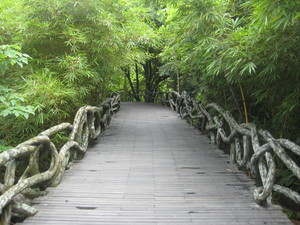 As I already wrote, we didn't manage to take the ferry and got to Haikou (and later to Sanya) by train - however, there is no bridge, so the train is put on a ship. Sadly, it wasn't possible to leave the train during that time. On our way back, it was somewhat difficult to get a ticket, as we left on the day after the typhoon - and all the people who planned to leave the day before either on the ferry or on a train also tried to get tickets so we had to queue for four hours.
As I already wrote, we didn't manage to take the ferry and got to Haikou (and later to Sanya) by train - however, there is no bridge, so the train is put on a ship. Sadly, it wasn't possible to leave the train during that time. On our way back, it was somewhat difficult to get a ticket, as we left on the day after the typhoon - and all the people who planned to leave the day before either on the ferry or on a train also tried to get tickets so we had to queue for four hours.Pictures from Hainan island
Pictures from Yanoda rainforest
Sunday, July 3. 2011
Guangzhou and the search for the ferry
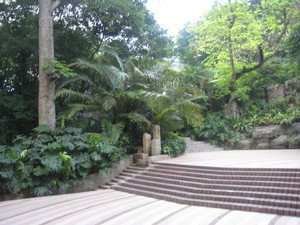 While going on to the south of China, we had a short stop in Guangzhou (广州). It is the third largest city in the country and the center of the cantonese part of China. At this time of the year, the climate in Guangzhou is very extreme, which we suddenly experienced when we left the train: Very hot and very humid.
While going on to the south of China, we had a short stop in Guangzhou (广州). It is the third largest city in the country and the center of the cantonese part of China. At this time of the year, the climate in Guangzhou is very extreme, which we suddenly experienced when we left the train: Very hot and very humid.Our original plan was to take the ferry to Haikou (海口) on Hainan (海南) island, but that failed because we were unable to find the ferry. First a taxi driver told us that the ferry doesn't exist at all. We then tried to find it at Huangpu port like it's statet on various internet pages, but there was no ferry and nobody could tell us anything useful about it. The information about Huangpu port you can find online (both place and days/times) is probably outdated. Although we didn't take the ferry at the end, if you find this information helpful to my best knowledge this should be correct (information from Haikou port and tourist information):
Haikou (海口) Xiuying (秀英港) port to Guangzhou Shazaidao port - starting from 2nd of every month every three days, 14:00
Guangzhou Shazaidao port to Haikou (海口) Xiuying (秀英港) port - starting from 3rd of every month every three days, 16:00
Price per person: ¥ 130 / ¥ 180 / ¥ 220 / ¥ 260 / ¥ 300 / ¥ 450 (room with more than 16 / 8-16 / 8 / 4 / 2 / 2 beds). Trip takes approximately 19 hours.
We also didn't take the ferry for our way back, as I already wrote, a typhoon stopped us from doing so.
On our unplanned one day stop in Guangzhou, we visited the Yuexi park (越秀公园). It is the largest urban park in China and it was a nice opportunity to see the tropical plant life in that area.
Guangzhou pictures (not many)
Guangzhou Yuexi park pictures
Thursday, June 23. 2011
Trapped by tropical Typhoon
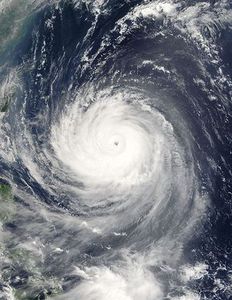 Due to current events, I'm abandoning the chronological order of my trip reports. You have probably read about the floods currently in China.
Due to current events, I'm abandoning the chronological order of my trip reports. You have probably read about the floods currently in China.We are currently in Haikou on Hainan Island in the south of China. Our plan was to take the ferry to Guangzhou today but all ferry services are cancelled due to the Typhoon Haima. You can follow its way on this japanese webpage.
So we are trapped and our Hotel will have us as guests some days more.
Sidenote: I had hoped to get informed about such dangers by the travelling information from the foreign ministry of Germany. But it doesn't even mention the Typhoon and Flood at all. The UK information was a bit more helpful.
Update: We've long left the typhoon area and nothing happened to us, I just didn't have the time to complete further blog entries.
Monday, June 13. 2011
From Mongolia to China
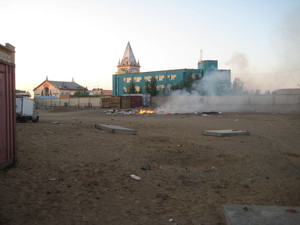 I promised before that I'll present a cheaper way than the international train to get from Ulaanbaatar on to China. But after doing it and all its obstacles, I'm not sure if I'd suggest it any more.
I promised before that I'll present a cheaper way than the international train to get from Ulaanbaatar on to China. But after doing it and all its obstacles, I'm not sure if I'd suggest it any more.Taking the normal train route on the transmongolian train, the way from Ulaanbaatar to any place in China is quite expensive. Our hostel offered us a train ticket to Jining (濟寧市) or Datong (大同市) for about 140 $. It would've probably been a bit cheaper at the train station, but still it's quite expensive.
Some people in the Hostel told us about a cheap alternative: Taking a local train to the border town Zamyn-Üüd (Замын-Үүд), then going with a Jeep through the border and then using a bus from Erenhot (二连浩特, also called Erlian) to Hohhot (呼和浩特, ᠬᠥᠬᠡᠬᠣᠲᠠ). However, it turned out that it wasn't that simple.
The ticket for the local train to the border costed 10.000 ₮ (about 7 €) for a hardsleeper. But it came with an unplesant surprise: They sell more "hardsleeper" tickets than there are hardsleepers in the train. So having a hardsleeper ticket with a reservation number does not mean that you have your sleeper for sure. For every two sleepers, three tickets are sold. We ended up having the lower beds and we could use them, but regularly people were sitting at the foot end of our sleepers.
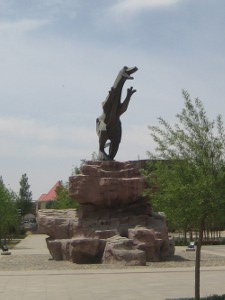 We wanted to go on from Zamyn-Üüd to Erenhot and were confronted with the next unplesant surprise: It was the first of June - international childrens day - and that's a national holiday in Mongolia and the border check is closed. So we were stuck in Zamyn-Üüd for a day longer.
We wanted to go on from Zamyn-Üüd to Erenhot and were confronted with the next unplesant surprise: It was the first of June - international childrens day - and that's a national holiday in Mongolia and the border check is closed. So we were stuck in Zamyn-Üüd for a day longer.In the evening, we saw the local way of "waste treatment": They just burned it openly. Mongolia is a country which has a lot of problems with air pollution (this is especially a problem of the capital city Ulaanbaatar, but I doubt it's much different there) - it would probably be easy to do this at least a bit better.
The next day, we went on with a jeep to the chinese border town Erenhot. In the end, we payed 10.000 ₮ (about 7 €) per Person plus a small fee at the chinese border I payed with a dollar due to the lack of any chinese or mongolian money.
There's not so much to say about Erenhot - the city is very fond of Dinosaurs (because some were found nearby in the Gobi desert) and has a couple of Dinosaur monuments.
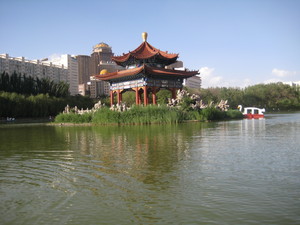 Now with that mysterious bus - I read on several places in the Internet that there exists a bus line between Erenhot and Hohhot, however none of them had anything to say where this bus departs, where you can buy a ticket or where you can find any information at all. It also turned out that communication here was a much bigger problem than thought - I think we didn't meet a single english-speaking person at all. So we ended up using a train to Hohhot, which was also quite cheap and comfortable.
Now with that mysterious bus - I read on several places in the Internet that there exists a bus line between Erenhot and Hohhot, however none of them had anything to say where this bus departs, where you can buy a ticket or where you can find any information at all. It also turned out that communication here was a much bigger problem than thought - I think we didn't meet a single english-speaking person at all. So we ended up using a train to Hohhot, which was also quite cheap and comfortable.We went to Hohhot not because of anything interesting there, it was just a stop to go on, as there aren't many options for further travelling from Erenhot. It turned out the People's Park there was quite nice and it was our first experience with a bigger chinese city. Afterwards, we went on to the south of China.
Pictures from Zamyn-Üüd
Pictures from Erenhot
Pictures from Hohhot
Tuesday, June 7. 2011
Ulaanbaatar
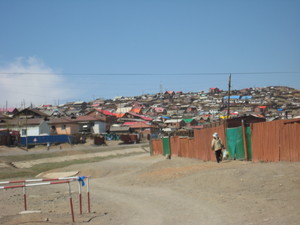 The next stop on our trip was Ulaanbaatar (Улаанбаатар), the capital of Mongolia. Mongolia is the most sparsely populated country in the world and about one third of the population lives in Ulaanbaatar. Large parts of the city consist of ger districts - a ger is a typical mongolian nomadic tent. In those districts, people live very dense either in gers or in very simple wood houses.
The next stop on our trip was Ulaanbaatar (Улаанбаатар), the capital of Mongolia. Mongolia is the most sparsely populated country in the world and about one third of the population lives in Ulaanbaatar. Large parts of the city consist of ger districts - a ger is a typical mongolian nomadic tent. In those districts, people live very dense either in gers or in very simple wood houses.Ulaanbaatar is a growing city. The ger districts still grow and in the southern part, a lot of apartment buildings are built. I haven't checked this with other sources, but two people from Ulaanbaatar told me that these constructions are mostly illegal, because they are in a nature reservate where only tourist ger camps are allowed, but corruption allows the constructinos to happen anyway.
The car traffic is very extreme in Ulaanbaatar. Most of the time there's a lot of traffic jam. Many car drivers seem to think that tooting a lot helps in the traffic jam. Very dangerous driving habits are common (this was also the case in russia, but much less extreme).
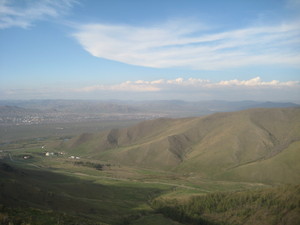 We wanted to visit the Terelj national park near Ulaanbaatar, but that failed because the bus times we got from the Internet were probably wrong (there is no bus at 11:00, no matter what the Internet tells you). Instead, we made a tour to the mountains south of the capital, which was also quite nice and interesting nature.
We wanted to visit the Terelj national park near Ulaanbaatar, but that failed because the bus times we got from the Internet were probably wrong (there is no bus at 11:00, no matter what the Internet tells you). Instead, we made a tour to the mountains south of the capital, which was also quite nice and interesting nature.We visited the Naran Tuul, which is a big market (REALLY big). You can get there just about anything, clothes, bicycles, food, solar cells, satellite dishes, ... We were warned a lot from pickpocketing in Ulaanbaatar in general and especially on the Naran Tuul, but we never had any problems with that.
One evening we visited the Tengis cinema, which I found a quite interesting experience. Movies there run in english with mongolian subtitles. The movie (Thor) was not so good (Pirates of the caribbean sadly wasn't running there yet). The cinema itself had much more atmosphere than the cinemas I'm used to from Germany. Below the cinema is an arcade - some crazy teenagers played a dance dance revolution-alike game in really unbelivable speed.
Pictures from Ulaanbaatar
Pictures from hills / nature near Ulaanbaatar
Monday, May 30. 2011
Local public transport
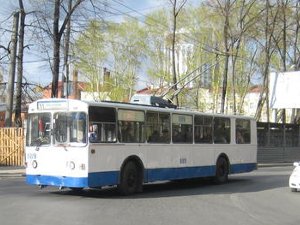 All russian cities we visited had a very well working public transport system. It consists of metros, trams, busses, trolleybusses and minibusses.
All russian cities we visited had a very well working public transport system. It consists of metros, trams, busses, trolleybusses and minibusses.On the metro, you pay for a coin (Yekaterinburg) or ticket (Moscow) before entering the area.
On Trams, you usually just get on the tram and there's a person where you can buy a ticket in the tram. It has a fixed price, which is usually between 10 and 20 rubels (about 0.25 to 0.50 €), if you need to switch the tram, you pay again. On busses, it's sometimes the same, if there's no person collecting ticket fees, you pay to the driver when leaving the bus. Same with trolleybusses and minibusses.
As long as you know which line to take, this is quite convenient. Usually, all lines come quite frequently, you only wait some minutes if you miss one. There was only one occasion where we had to take a taxi in Russia (to get the ferry to Port Baikal in time - the ferry itself worked like the trams, you pay on the ferry).
In Ulaanbaator, we found it a bit harder, mainly because we never really found out which bus to take (no tram or metro here). The ticket system is the same (you pay to a ticket seller on the bus). The busses here are often very overcrowded. Taxis here are really cheap, so that's what many people use.
(Page 1 of 2, totaling 23 entries)
» next page